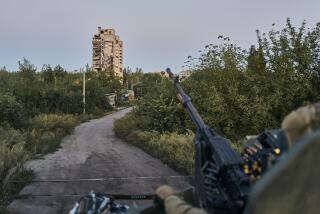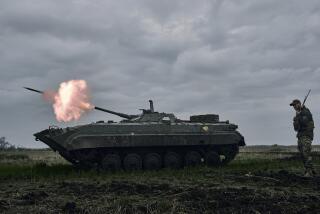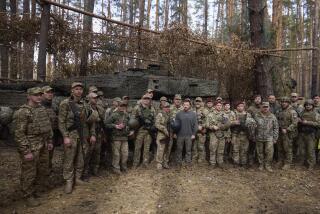Russia rebrands its Crimean incursion
KIEV, Ukraine — It’s not Moscow calling the shots in Crimea, it’s local “self-defense forces.”
The Kremlin didn’t reinforce its troops on the strategic peninsula to seize it but to respond to an appeal from deposed Ukrainian President Viktor Yanukovich, now being cast as weak and misguided. And in any case, all Russian forces in Crimea are back at their bases.
Or so insist Russian officials, who are apparently seeking to rewrite the narrative of their military incursion into Ukraine that has shocked the world, frightened former Soviet-dominated neighbors and sent the Russian ruble and stock market into tailspins.
But the Russians may not be backing off so much as settling in.
Russia and Ukraine, with deeply entwined economies as well as historical and geographic imperatives to stay connected, may be entering a prolonged period of stalemate.
Russian gunmen, whether dispatched by the Kremlin as Kiev alleges or acting on local Crimean Russians’ mistrust of Ukraine’s new pro-West government, are likely to maintain their grip on the peninsula for weeks or months.
Ukraine’s armed forces are outgunned by Russia’s and any push-back could trigger a shooting war with no true winner, given the international censure and economic strangulation that Russia would face after wresting Crimea from its weaker neighbor.
On Wednesday, a fresh contingent of 200 Russian troops beefed up control of a Ukrainian air defense base in Yevpatoria, north of the Black Sea fleet port of Sevastopol. They stood guard at the gates, securing the stock of antiaircraft missiles. Some wore their Russian military insignia, a Ukrainian commander said, dispensing with the pretext of being concerned locals.
Russian gunships offshore at Sevastopol also continued to blockade Ukrainian naval vessels, despite the early Tuesday expiration of an ultimatum for the crews to surrender and swear allegiance to Russian command.
In Kiev and other European capitals, diplomacy kicked into high gear. That has created an impression of a pause for reflection and, in Moscow’s case, a chance to recast its posture in the Crimea face-off as reluctant aid to an ally.
Putin and Russia’s United Nations ambassador, Vitaly Churkin, both blamed Yanukovich, their erstwhile ally, for prompting the Russian deployment by portraying the change in political leadership in Kiev as a threat to the lives and cultural autonomy of Russians in eastern and southern Ukraine.
Russian Foreign Minister Sergei Lavrov, in press appearances in Madrid and Paris, denied that Moscow was calling the shots in the tense confrontation in Crimea. The peninsula was part of Russia for centuries until 1954, when Soviet leader Nikita Khrushchev annexed it to the Ukrainian Soviet Socialist Republic.
“Those who sit in the Verkhovna Rada [Ukrainian parliament] do not control the whole territory,” Lavrov said, warning the Western intermediaries trying to de-escalate the Crimea crisis that they should be talking to the territory’s local leaders.
“Russia does not give orders to self-defense forces in Crimea,” Lavrov said.
U.S. Secretary of State John F. Kerry, who was in Kiev on Tuesday and traveled with his Ukrainian counterpart, Foreign Minister Andriy Deshchytsia, for meetings in Paris on Wednesday, sought to downplay the limited results of their travels.
Kerry said he had had “zero expectation” of Lavrov and Deshchytsia talking on the sidelines of the gathering, originally intended to discuss the Syrian civil war.
Lavrov said conditions were not right for a meeting with the Ukrainian diplomat, describing the atmosphere as one of “threats and ultimatums.”
Kerry said he reiterated Washington’s call for Moscow and Kiev to open direct talks, for Russian forces to withdraw to their bases and for the Kremlin to welcome human rights monitors to gauge the state of ethnic
relations in Ukraine’s Russian-dominated areas. He pointed to a confusing incident involving a U.N. envoy, Robert Serry, who was confronted by Russian gunmen Wednesday in Crimea and told to leave the territory.
Lavrov said in Madrid, after talks with his Spanish counterpart, that Russia’s Black Sea fleet forces were “staying at the sites of permanent deployment,” countering reports of Russian troops fanning across Crimea to seize control of Ukrainian military sites such as the air defense base in Yevpatoria.
Yanukovich was driven out of power by a three-month uprising in western Ukraine after he ditched an association agreement with the European Union in late November that was to have led to closer economic ties with the 28-nation bloc. Russia had rewarded him with a promised $15 billion in loans and energy subsidies — both since retracted — in what was seen as a Kremlin move to prevent Ukraine from drifting from Moscow into the West’s economic and military orbit.
Little public outcry in Russia has followed the military incursion into Ukraine. But the ruble has fallen to historic lows in the last week, and Russian stocks have lost 10% of their value, hitting ordinary Russians in their pocketbooks as prices soar and savings dwindle.
NATO leaders meeting Wednesday in Brussels gave Moscow a taste of the hostility it most fears now that its Cold War-era military bloc, the Warsaw Pact, is long since disbanded and most former allies are aligned with the erstwhile rival. NATO chiefs said they were suspending meetings with Russia, and U.S. Defense Secretary Chuck Hagel said the alliance was stepping up patrols around Poland and the Baltic states in response to Russian aggression against Ukraine.
The Pentagon said it will send six F-15 fighter jets and an air refueling tanker to Lithuania. Gen. Martin Dempsey, chairman of the Joint Chiefs, said he had spoken with his military counterparts in the Baltic nations and Eastern Europe in recent days and promised to seek options “to deter further Russian aggression.”
Dempsey also said he spoke by phone with Gen. Valery Gerasimov, the chief of the Russian general staff, and conveyed “the degree to which Russia’s territorial aggression has been repudiated globally.”
Russia’s sensitivity to seeing its former allies embraced by NATO is a divisive factor in Ukraine, where the large populations of ethnic Russians and Russian-speakers in the east and south — as in Crimea — oppose leaving their traditional defense collaboration with Moscow. Those in the west fear Russia’s smothering embrace, all the more so now that Kremlin troops have seized control of their Crimean bases.
However, Ukraine’s special government representative assigned to work toward resolving the Crimean crisis, Petro Poroshenko, said Kiev is opposed to seeking closer ties to the North Atlantic Treaty Organization at the moment.
“This is not what we should do now,” Poroshenko said. “We have to have the confidence and trust of all parts of the country. For the future of Ukraine, the first task is unity.”
European financial officials announced Wednesday that they had worked out the details of a $15-billion loan and aid package for Ukraine, whose debts threaten default and economic crisis now that Moscow has withdrawn aid.
Analysts cautioned that the EU’s relief package may be somewhat less generous an offer than it appears.
Governments often inflate such pledges for public relations, and Europe has been under pressure to match Russia’s earlier pledge of $15 billion, noted Andrew Kuchins, a Russia specialist at the nonpartisan Center for Strategic and International Studies in Washington.
The sum could, for example, include loans that Europe gives to European farmers to pay for exports to Ukraine, he said.
Civilian emissaries visiting Kiev have cautioned Ukraine’s new leaders to be patient in the face of what most concede is a blatant violation by Russia of its former Soviet sister republic’s territory and sovereignty.
Despite being the aggrieved party, Kiev was told that it should be careful not to provoke. One visiting U.N. official, Deputy Secretary-General Jan Eliasson, said the situation reminded him of the hair-trigger tension in Sarajevo in 1914, when a young Serbian nationalist’s shot killed the Austro-Hungarian crown prince and ignited World War I.
Williams reported from Kiev and Loiko from Yevpatoria, Ukraine. Special correspondent Kim Willsher in Paris and Times staff writers Henry Chu in London and Paul Richter and David Cloud in Washington also contributed to this report.
More to Read
Start your day right
Sign up for Essential California for news, features and recommendations from the L.A. Times and beyond in your inbox six days a week.
You may occasionally receive promotional content from the Los Angeles Times.







